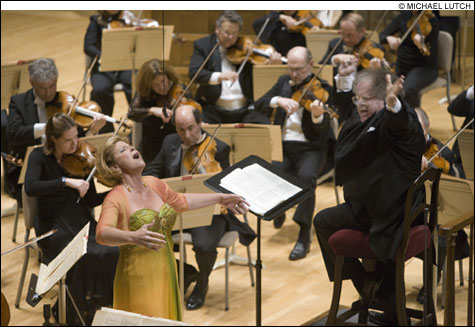
SHÉHÉRAZADE Ravel’s darker insinuations were missing from Susan Graham’s performance. |
It wasn’t as bad as what happened at Opening Night at the Pops last May, when a patron who tried to get his neighbor to stop talking during the concert nearly got himself thrown off the Symphony Hall balcony. But it was still awful. At the gala Opening Night at Symphony, I was trapped in the first balcony next to an elegantly dressed woman who’d had far too much to drink and insisted on telling me her life story and how much she loved music — while the music was playing. When I wouldn’t participate in this conversation, she began hurling obscenities. Her companion was no help, and neither was the shushing from surrounding patrons. Then, during the quietest parts of the music, came the weepy apologies, loud sniffling, and louder nose blowing. No intermission meant no escape. A BSO representative tried to get help, but nothing could be done without causing an even greater disturbance. Finally, the couple staggered out before the last piece. So this review is based more on what I was trying not to be distracted from than on what I was able to concentrate on.
The music was all Ravel (a BSO specialty): the scintillating Alborada del gracioso (“the dawn song of the buffoon”) and the orgiastic second suite from Daphnis et Chloé, the jazzy G-major Piano Concerto, with French pianist and fashion plate Jean-Yves Thibaudet, and the ravishingly sly, sexy Shéhérazade, with Metropolitan Opera mezzo Susan Graham. Was it the relatively insubstantial, over-familiar program (much of it repeated from last season in Boston and Tanglewood) or the pricy tickets ($2500 top, including dinner and limo service) that left so many seats vacant at Symphony Hall? Who are the people these expensive fundraising galas attract?
Both James Levine and the orchestra seemed in great shape after their European tour. The playing was blindingly brilliant. Alborada was originally a piano piece, and its tripping rhythms are even more challenging for an entire orchestra, but the strings were impeccable, and bassoonist Richard Svoboda played an atmospheric solo. Daphnis too was a sonic spectacular. But there also seemed something a little vulgar about the conception. Not boring, certainly, but all surface, all dazzle, lacking the mysterious, alluring French-ness so magical when, say, Pierre Boulez conducts Ravel.
Something similar with Shéhérazade. Susan Graham has a lavish voice that she uses with real musical intelligence; yet in these nuanced settings of three exotic, ambiguously erotic poems by Tristan Klingsor, she too remained on the surface, projecting the hardy, healthy glow of satisfaction rather than Ravel’s darker insinuations, his variegated shadows of longing and regret. Principal flute Elizabeth Rowe helped with a seductive flute obbligato in the second song, “La flûte enchantée” (though in the more famous flute solo in Daphnis, so erotic yet so chaste, she remained rather too aloof and monochromatic).
The hit of this French program was Thibaudet, whose glistening pianism and rive gauche lounge style (leaning back from the keyboard at an acute angle) embodied Ravel’s debonair cool. The dreamy slow movement floated from point of light to point of light, and Robert Sheena’s after-echo of the main melody on the English horn kept that dream alive.